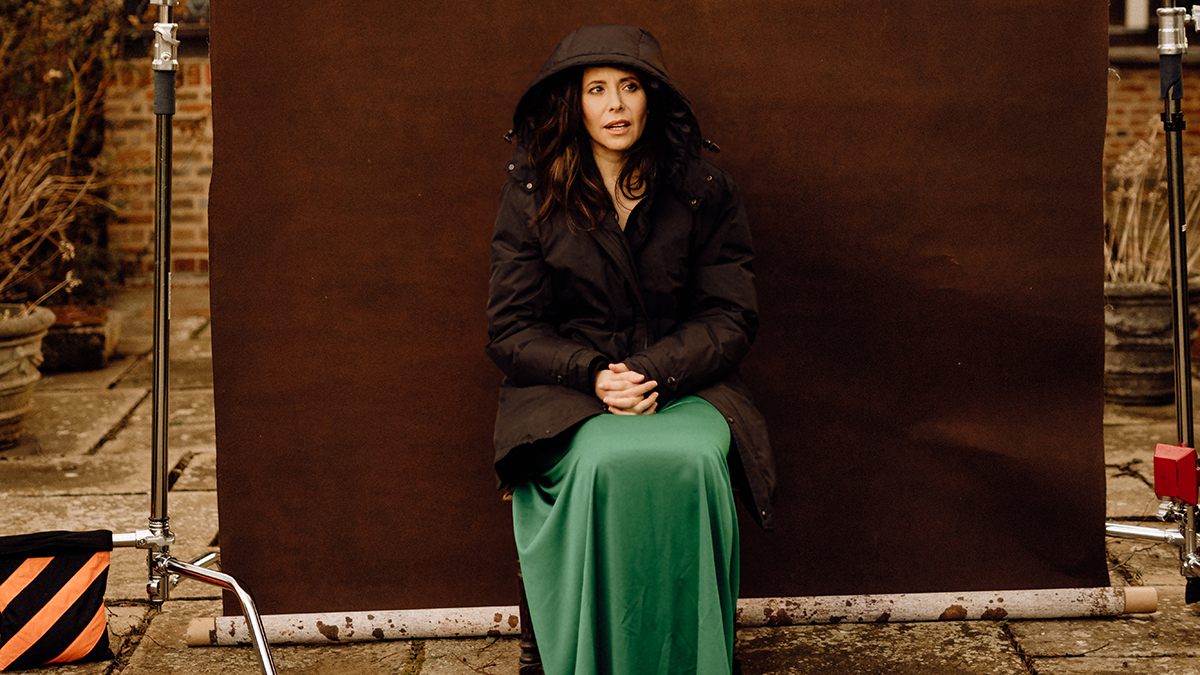Nerina Pallot: “It’s about being in love with what you can do with a few chords and the melody, because you can do anything"
The singer-songwriter on her new album, appearing on the soundtrack to Normal People, and working with Kylie

“I don’t know what I’m doing,” sings Nerina Pallot on the title track of her new record, but we’d beg to differ. This, after all, is the Jersey-born singer-songwriter’s seventh full-length studio album, suggesting that, whatever it is she’s doing, she’s doing something right.
Pallot puts her longevity down to “Happy accidents and just sheer bloody mindedness,” adding that “this is what I do, and I'm gonna keep doing it”.
I Don’t Know What I’m Doing is steeped in classic singer-songwriter history, with echoes of classic-period Elton John, Carole King, Joni Mitchell and Stevie Wonder. "I don't think I'll ever tire of the records from that era,” says Pallot. “They're complete to me. They're so rich musically, and lyrically they're clever, but they're accessible. And they're not trying to be clever, but they are really clever."
Pallot’s songwriting, too, is smart. When it comes to chord progressions, she has a gift for taking her listeners by surprise without taking them too far out of their comfort zone - something that’s increasingly rare in pop circles.
“I love the unexpected,” she tells us. “I think that's what a lot of the jazz soul I'm into does as well, harmonically. I mean, it may not be immediately obvious from my music, but when I was a kid, I was a massive Anita Baker fan. Because I just think her changes are so interesting. And interesting in the soul genre. She doesn't do harmonically what a lot of other writers did.”
Steely Dan are also a touchstone: “You put a record on and you're like, I'm going on a trip, and I've got no idea where I'm gonna end up. Why wouldn't you go to an A eleven, sharp nine and then do an E flat minor seven with a sharp second? Of course that's what you're meant to do…”
As with many recent albums, the production of I Don’t Know What I’m Doing was interrupted and ultimately shaped by the pandemic. “I started writing for the record in 2018, and the very first track I recorded for the album was the second song on the album, Alice At The Beach,” says Pallot. “And that I had pretty much finished - well, I'd probably got 80% of it done - by Feb 2019. And then I sat on that for a bit, because I thought, 'Well, I actually really like this direction, I want to make a record in this sort of vein'.
Want all the hottest music and gear news, reviews, deals, features and more, direct to your inbox? Sign up here.
“And then I started to write in earnest. And my timing was impeccable there [laughs]. And by the end of 2019, I was like, 'Oh, I think I've got a record here', so I promptly booked January and February for the studio. And it was quite apparent during February that the world was going through a bit of a phase. And I had things like string orchestras and stuff booked, and then I remember the penultimate week in March, the penultimate week before lockdown. Everything was being cancelled, left, right and centre, and it just looked like, 'OK, we'll put this on hold for a few weeks'. That's how optimistic I was…”
Of course, ‘a few weeks’ turned into a whole lot longer, forcing something of a rethink. "Probably come June, I accepted that COVID wasn't going anywhere. And so I thought, 'well, you know what, I'm going to embrace building a home studio. I'm going to do it properly. I'm not going to have this sort of corner of a spare room that I just keep very basic.'
"What I realised was, you know what, fuck it, you're stuck. You might as well make this a nice space.”

This new normal, it turns out, resulted in a creative restart, too: “I was like, ‘Alright, OK, let's rethink this whole album'. So then I started to write again and I would say, pretty much 70% of the album, I started again, in this space. And I guess, you know, there won't be an album now that it's not a pandemic album, whether you're referencing it or not. Because it's such a profound shift in humankind, that everything will be influenced by it... the songs definitely reflect that."
That ‘pandemic influence’ extends to the aforementioned title track: "It just popped out one day, and I just really clung on to it,” says Pallot. “I thought it was a really honest song. I wrote it in probably the peak lockdown. That last lockdown was the hardest, wasn't it, in January?
I realised I was wasting months, obsessing over a soft synth sound, and I wasn't really writing.
"There's a trajectory of the songs - the chronology of the songs - the bleaker they get, they're the newer ones, because I think by the last lockdown, we were all losing the time of day, because it was so dark as well. And some days, I would literally walk into a room and have no idea why I was there. I'm here. Like, what am I supposed to be doing?"
Having had sound engineer training, Pallot knows her way around the studio, but is less involved in some of the technical aspects of production than she once was. “I'm in a fortunate position that I can get other people to engineer for me now,” she says. “I was an early adopter with Pro Tools, when it was like eight tracks and you thought you had this incredible thing. When it was a rack this big, you know? But I do less and less of it these days.
“I went through a phase between my second and third album where I just lived in the box. Like I just lived with plugins and I just was losing sight of what songs were because suddenly you can have these soft synths - you know, that time in the mid-noughties when stuff really started to explode and Logic came to the fore? And I realised I was wasting months, obsessing over a soft synth sound, and I wasn't really writing."
One plugin that Pallot has stuck with is Auto-Tune. It’s used ‘audibly’ on Cold Places, I Don’t Know What I’m Doing’s opening track, and Pallot freely admits that she’s been using it correctively for years. What’s more, she’s noticed it having an effect on the way vocals are actually sung.
"Sometimes you'll hear young girls just walking down the street, or they're in a shop or whatever, and they're singing the Auto-Tune, but they're singing it organically,” she observes. “And that blows my mind. It blows my mind. I can't do that, because I haven't grown up my whole life listening to Auto-Tuned vocals, but we all need to be less precious about music in that way. It doesn't serve anybody, because it just stands in the way of creativity."
From Elgar to Akai
Although it can be a distraction, it’s also reasonable to suggest that ‘in the box’ technology has also helped to streamline and simplify the music production process, so what of the argument that it’s made it too easy?
"No, because think about it: If somebody from Edward Elgar's time at Abbey Road, when they were doing it on shellac, popped into a studio in 1997 or whenever and saw what we could do with Akai samplers? I mean, we look back on those now. We're like, 'shit, we had to get our calculators out', and ridiculous things. But if a dude from Edward Elgar's time came in they'd be like 'you don't know how incredible it is', you know?"
Pallot’s point, of course, is that things have also moved on considerably since 1997, and she can see the democratising benefits of the home recording revolution for the music industry as a whole.
"Remember when we were teenagers, how much money gear cost?” she asks. “I lusted after the Akai S5000, where you could remove the panel, and you could program it separately from the body of the thing itself. And that, to me, was like wizardry, and that was like, four or five grand? Think about what it cost to start a workable home studio, you wouldn't have had any change from ten grand in the 1990s.
“Now, in this laptop, you could probably set your kid up, done and dusted, 1500 quid the whole lot. And they’ll be making really good quality music. And it's so refreshing that we will get out of the stranglehold of the majors who have just been these gatekeepers because they've had all the budgets to make records. I mean, it's harder to get exposure, but there's this world on YouTube of brilliant musicians, who if they didn't have this access to high-quality recording we would never hear about. I think it's really exciting."

It becomes apparent that Pallot has something of a love/hate relationship with the record industry. She’s released albums on both major labels and her own (Idaho Records) but, despite the fact that she’s been able to sustain a career in the music business on her own terms, she sometimes wonders what might have happened if she’d chosen a different path.
"I'm immensely grateful for where I'm at,” she says, “but I also see some friends who are having these ridiculously easy lives, you know, where nothing seems to touch them, and they're on a private jet here, and they're doing this and they're shamelessly putting it on their social media. And we all have the angst, don't we?
“I never had a plan with my life. And I'm at this point where I’m raising kids. And the whole point of being a parent is, hopefully, you pass on wisdom based on mistakes you've made. And so for me, I just sometimes wish I'd been more careerist. Where I've had things happen that have been really great for my career, they have been utter accidents. There has been nothing by design in my life."
Normal People pleaser
Speaking of which, the inclusion of Pallot’s stripped-back, piano-led cover of Joy Division’s Love Will Tear Us Apart on the soundtrack to the smash-hit TV adaptation of Sally Rooney’s Normal People certainly didn’t happen by design.
"I love the song. I love the original, obviously, but I started to play it around 15 years ago, or 16 years ago, even. And randomly, I'd done a show in Dublin. And this gentleman had been at the show and remembered that I'd pulled it out. And he's a music supervisor, and he kept thinking 'I really want to use that version of Love Will Tear Us Apart in a TV show'. And he kept thinking about where he could put this for, like 12 or 13 years.
“And then suddenly, because I did a version of it as a live freebie or something years ago, out of the blue, literally the week before lockdown. I got a note from him saying, 'can we have permission to use this for this show Normal People?’ And it came through my husband, who manages me, and he said, 'Do you want them to use it? Or should we say no?' And I said, ‘which Normal People?' and so he said 'it's by some woman called Sally Rooney'. And I was like, that's one of my favourite books of the last few years! Of course, even if it's really shit, they can put it in there because it's Sally Rooney. And I had no idea that we'd all be bingeing it in lockdown."
Another ‘happy accident’ resulted in Pallot writing for Kylie Minogue. She and husband Andy Chatterley penned and produced both the title track of her 2010 LP Aphrodite and the album’s third single Better Than Today.
“It was just marvellous,” says Pallot of the experience. “The whole album and tour centred around the song I'd written for her, Aphrodite, where she sort of reimagined herself as a Greek goddess and stuff. And it was great, because I was being asked to be me, but in a pop setting.
“There are very few artists where when you write for them, it's like, you can go off on a fantasy, and commerce is almost out of the window. The brief is just 'be wonderful and amazing' because she's like a pop fairy. So that was a dream gig, but the problem is, there's only one Kylie. The rest of the artists you get put in a room with are not Kylie."
If you're commercial it should be by accident, not by design.
Ah yes, that. When discussing writing for/working with other artists, Pallot is less enthusiastic. "I'm very careful not to bite the hand that feeds, because that hand has fed me on occasion, but it's not for me. But what happened was, suddenly the phone started to ring and then sometimes certain artists come on the telly and I think 'shit, I should have worked with them'. But I hated their voice [laughs]. I hated what they stood for."
Perhaps wisely, Pallot doesn’t elaborate on who she’s talking about here, other than to say that she’s referring to "some really big names”. It’s clear, though, that being part of the ‘pop machine’ isn’t on her agenda.
"Loathe it - would rather chew my own arms off,” is her response when we ask how she feels about co-writing, “Because the moment you do it, commerce enters the room. What drew you to music, for example? It wasn't thinking about how much money that song was making, was it? It's a really pure thing. And I really worry that, because the majors have found this massive cash cow, the next generation will see music as this commercial venture when it's never been that. If you're commercial it should be by accident, not by design."
Despite her evident distaste for what could be described as the grubbier side of the music business, Pallot does concede that she wouldn’t mind having a big hit of her own. Her most successful single - Everybody’s Gone To War - was, after all, released back in 2006.
"Here's the truth,” she confides. “I've got this attachment to the chair I wrote Everybody's Gone To War on, and the bass I wrote it on. And I've literally sat on that chair with that bass about 100 times since, going, 'Let's do it. Let's do it again'. And I've never done it again!"
Although she’s come to the conclusion that you can’t just sit down and decide to write a hit record - "Of course I've tried and it never works, does it?” - Pallot does believe that you can often tell when you’ve heard one.
When I hear things like Bridge Over Troubled Water, or I hear Wichita Lineman, or I hear Hey Ya! by Outkast, my heart still skips a beat thinking 'this is what you can do in three minutes'.
"There's a magic,” she explains. “The mastering engineer I work with at Abbey Road - he's wonderful, Miles Showell - one of the first big records he mastered in his career was Never Gonna Give You Up by Rick Astley. I was talking to him about it. And Miles has got very eclectic taste. I don't imagine that he's a super pop fan. But he said to me, when that record got sent to him, he said he'd never heard of Rick Astley. He vaguely knew who PWL were, but he set that record up to start mastering and he said ‘I knew with every fibre of my being that this song was going to be massive'. He said 'I couldn't explain it. I don't know why it was. I just knew this song was bigger than everybody involved in it. And it was exciting. And I didn't even have to like it... it just had this 'thing'."
Pallot’s thing, it seems, will be to continue to record and perform - there’s a tour planned for later this year and talk of work starting on another album - and it’s clear that her passion for music remains as strong as ever.
“I still haven't tired of what I could do with three minutes,” she says. “When I hear things like Bridge Over Troubled Water, or I hear Wichita Lineman, or I hear Hey Ya! by Outkast, my heart still skips a beat thinking 'this is what you can do in three minutes'. And when you get it right, it gets this wider audience because you're connecting on a wide scale, because you've gone into the magic place, wherever that magic place is, and that magic place isn't cynical. And that magic place is about being in love with what you can do with a few chords and the melody, because you can do anything."
Nerina Pallot's new album, I Don't Know What I'm Doing, is available now.

I’m the Deputy Editor of MusicRadar, having worked on the site since its launch in 2007. I previously spent eight years working on our sister magazine, Computer Music. I’ve been playing the piano, gigging in bands and failing to finish tracks at home for more than 30 years, 24 of which I’ve also spent writing about music and the ever-changing technology used to make it.